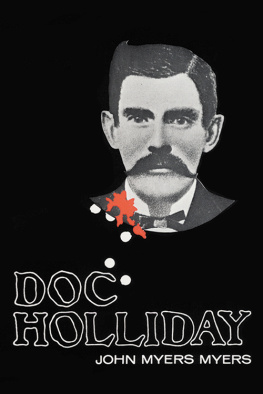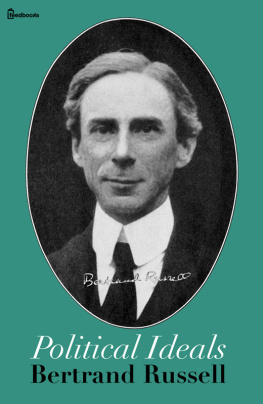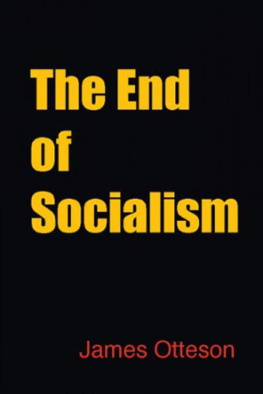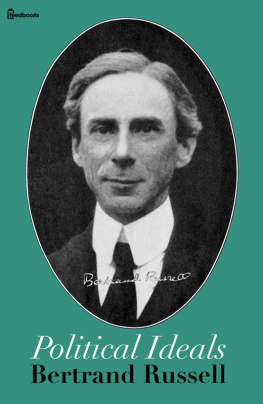William Starr Myers, Ph.D.
Professor Of Politics, Princeton University
Princeton University Press
Princeton
London Humphrey Milford
Oxford University Press
1919
1919, by
Princeton University Press
Published February, 1919
Printed in the United States of America
To
The Memory Of
Samuel Selden Lamb
In Partial Fulfilment Of A
Mutual Promise Made At
"dear Old Chapel Hill"
PREFACE
The following essays originally appeared in the form of articles contributed at various times to the (daily) New York Journal of Commerce and Commercial Bulletin. Numerous requests have been received for a reprinting of them in more permanent form, and this little volume is the result.
I am deeply indebted to my friend Mr. John W. Dodsworth, of the Journal of Commerce, for his kind and generous permission to reprint these articles. Since numerous changes and modifications from the original form have been made the responsibility for these statements and the sentiments expressed rests entirely upon me.
I hope it is not necessary for me to say that this is not intended as an exhaustive study of the more or less widespread movement to advance paternalism in Government. My object is to lay before the people, in order that they may carefully consider them, the reasons for thinking that Socialism is in theory and practice absolutely opposed and contrary to the principles of Americanism, of democracy, and even of the Christian-Jewish religion itself.
Wm. Starr Myers.
Princeton, N.J.
November 28, 1918.
CONTENTS
| Materialism and Socialism | 3 |
| The Conflict with the Idea of Equality of Opportunity | 13 |
| Why Socialism Appeals to Our Foreign-Born Population | 23 |
| Its Conflict with the Basic Principles of Democracy and Religion | 34 |
| Some Instances of its Practical Failure | 54 |
| The True Antidote Found in Co-operative Effort | 74 |
| 87 |
INTRODUCTION
MATERIALISM AND SOCIALISM
It was about a decade ago that Professor E.R.A. Seligman of Columbia University published his valuable work on the "Economic Interpretation of History," which gave a great impetus to the study, by historians, of the economic influences upon political and social development. Professor Seligman showed conclusively that one of the most potent forces in the growth of civilization has been man's reaction upon his material environment. Since that time the pendulum has swung so far in this direction that many students of history and economics would seem to think that all of life can be summed up in terms of materialism, that environment after all is the only important element in the advance of society, and that mankind is a rather negligible quantity. This is just as great a mistake as the former practice of ignoring economic influence, and even so great an authority as Professor Seligman would seem to tend in that direction.
On the other hand, Mr. George Louis Beer rightly claims that "the chief adherents of economic determinism are economists and Socialists, to whom the past is, for the most part, merely a mine for illustrative material. The latter, strangely enough, while explaining all past development by a theory that conceives man to be a mere self-regarding automaton, yet demand a reorganization of society that postulates a far less selfish average man than history has as yet evolved."
Most thoughtful people of to-day know that the political and economic elements were just as strong as the religious one in the Protestant Reformation in Germany, but that fact by no means would lessen the value of the gains for intellectual and religious freedom that were won by Martin Luther. Again, bad economic conditions had as much, or more, to do with the outbreak of the French Revolution as did political and philosophical unrest. Also taxation, trade and currency squabbles had more to do with causing an American Revolution than did the idealistic principles later enunciated in the Declaration of Independence. And there was a broad economic basis for the differences in crops, transportation and the organization of labor which expressed themselves in a sectionalism which finally assumed the political aspect that caused the Civil War. Yet the student who would forget the spiritual element in our life, who would overlook the fact that man is a human being and not a mere animal, will wander far astray into unreal bypaths of crass materialism.
On the other hand, it would be hard to find an economic explanation for the emigration of the Pilgrim Fathers to Plymouth, for the Quaker agitation that supported John Woolman in his war upon slavery or for most of the Christian missionary enterprises of the present day. Also it would take a mental microscope to find the economic cause for the extermination of the Moriscos in Spain by Philip III. or the expulsion by Louis XIV. of the Huguenots from France. These two great crimes of history had important economic consequences, but the cause behind them was religious prejudice. Prof. James Franklin Jameson, of the Carnegie Institution at Washington, rightly has stressed a study of the religious denominations in the United States, of the Baptist, Methodist and other "circuit riders" of the old Middle West, as one of the most fruitful sources for a fuller knowledge and understanding of the history and development of the American nation. Neither George Whitefield, Peter Cartwright, nor Phillips Brooks of a later day, can be explained in terms of economic interpretation.
This false and entirely materialistic conception of the development of society and civilization is a mistake not only of the learned, but of the pseudo-learned, of the men and women of more or less education whose mental development has not progressed beyond an appreciation of Bernard Shaw, Henrik Ibsen and H.G. Wells. Most of them are estimable people, but the difficulty is that they are so idealistic that, so to speak, they never have both feet upon the ground at the same time. This is especially true of our esteemed contemporaries, the Socialists. These cheerful servants of an idealistic mammon pride themselves upon completely ignoring human nature. A few years ago, at a London meeting of the "parlor Socialists" known as the Fabian Society which, by the way, was presided over by Bernard Shaw, an old man began to harangue the audience with the words, "Human nature being as it is" At once his voice was drowned out by a chorus of jeers, cat-calls and laughter. He never made his address, for the audience was unwilling to hear anything about "human nature." No Socialists in general are willing to do so, for human nature, with the mental and spiritual sides of life, is just the element with which their fallacious creed cannot deal, and they know it. But the human element must enter into business and trade in the problems of direction, management, even in the form of competition itself, and cannot possibly be eradicated.
It is amusing to note that these same Socialists are busily occupied with pointing out what they consider to be the failures of government, as well as of "business and capitalism." Yet they do not realize that they are thus condemning their own system, for if the governments of the world have failed to do the work at present laid upon them, how can they ever undertake the gigantic additional political and capitalistic burden that Socialism would impose? Thomas Jefferson, the patron saint of the party that President Wilson now leads, always expressed a fear of "too much government." It would appear that the present Administration and the Democratic members of Congress have wandered far from their old beliefs, and if recent legislation is the result of it, their Socialistic experiments have not been much of a success.












